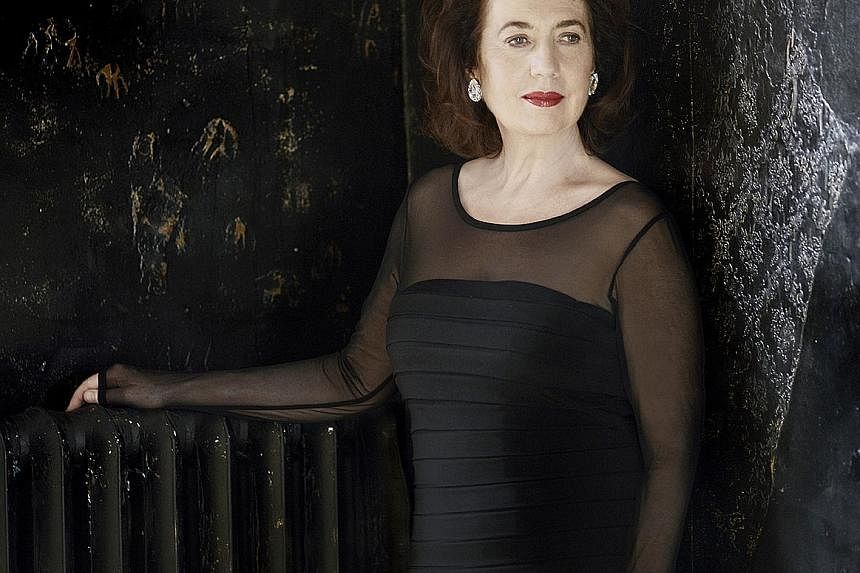From picking out Christmas carol melodies on the piano with one finger at the age of three, Imogen Cooper has gone on to win acclaim as a concert pianist for more than five decades.
Despite a packed touring schedule - she travels out of her London base three times a month on average - she still greatly enjoys performing for a live audience.
After all, the 65-year-old says her main aim as a performer is to "make people feel better", whether it is by touching them or by making them laugh and enjoy themselves.
Sometimes, her performances have an additional layer of spirituality to them as well. "When everything goes really well, sometimes there will be a benediction, a blessing of sorts, which overcomes both the audience and myself," she says, over the telephone from Hong Kong where she has a concert.
-
Book it
-
ROMANTICS AND NATIONALISTS
Where: Victoria Concert Hall
When: Thursday, 7.30pm
Admission: $35 to $80 from Sistic (call 6348-5555 or go to www.sistic.com.sg)
Cooper will hold a recital here on Thursday as the opening act of the 22nd Singapore International Piano Festival. It is her second time performing in Singapore - her first was in 1996 for a piano recital at Victoria Concert Hall - and she looks forward to visiting the Botanic Gardens, meeting up with friends, trying local cuisine and spreading the love of music.
"We are so lucky to have music", she says, "we need to listen to it with our hearts and souls."
The theme of this year's festival, Romantics And Nationalists, celebrates the intense expression of the Romantic movement and explores national culture and ethnicity through four international pianists of contrasting styles. Olli Mustonen, Lars Vogt and Lukas Vondracek are the other pianists performing at the four-day festival.
Cooper's repertoire for the festival comprises Chopin's Barcarolle, Op 60, Schumann's Humoreske, Op 20, and Schubert's 12 German Dances, D 790, and Piano Sonata In A Major, D 959.
Her love for Schubert's sonata started more than 40 years ago, with "the piece having more dimensions of ingenuity" each time she plays it.
One of his last sonatas, it has been praised for its mature style, manifested in unique features such as a cyclical formal and tonal design, chamber music textures and a rare depth of emotional expression.
She also decided to play his lesser- known piece, 12 German Dances, as she feels it best encapsulates the experiences of Schubert, whose deteriorating health led him to suffer intensely - he died of syphilis, 16 years after the piece was composed, at the age of 31.
In spite of his physical agony, the piece is gentle, sensitive and full of tenderness.
"It's full of the madness of Schubert - it requires both an open heart and open ears to appreciate it," says Cooper, who is divorced from her husband of 20 years and has no children.
Best known for her interpretations of Mozart and Schubert, she was a recipient of a Commander of the Order of the British Empire (CBE) in the Queen's New Year Honours in 2007. She has performed with the world's top orchestras, from the New York Philharmonic to the Vienna Philharmonic.
Cooper first started formal music lessons at the age of three. Her father, Martin Cooper, was a music critic and musicologist and her mother was an amateur singer.
A self-professed free spirit, she decided at the age of 11 that she wished to pursue the piano professionally.
She moved to France on her own to attend the Paris National Conservatory Of Music, studying there from the age of 12 to 18.
Speaking about the experience, she says: "I loved Paris, but the education was very tough. I learnt discipline and practised six hours a day".
Afterwards, she studied piano under the internationally renowned virtuoso Alfred Brendel.
The most challenging piece in her repertoire is Schumann's work, which is full of potential downfalls.
The 41-minute-long piece requires an intense amount of concentration from the British pianist. The piece is also paradoxical in that it has to sound "out of control", as Cooper puts it, meaning the creation of an impression of madness that requires a great deal of skill and control on the part of the pianist.
However, she laughs it off, saying: "I like hard pieces."

